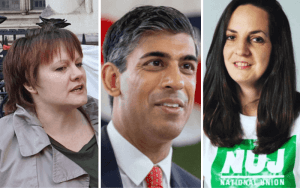
Conservative Mark Harper said there were now more than three million disabled people in employment an increase of 250,000 in the last year, and that more than 1,100 employers had signed up to the government’s Disability Confident scheme, which was launched last year.
But he said: “This is not about saying to employers, ‘You should employ disabled people because it is the right thing to do,’… you should hire disabled people because they are smart, talented individuals with lots to offer.”
Only last month, the party was claiming that the number of disabled people in work had risen 116,000 in the last year.
But a spokesman for Harper said that this referred to the increase between the April to June 2013 period (2.82 million) and the same quarter in 2014 (2.94 million).
He said the number of disabled people in employment rose in the next quarter (July to September 2014) to 3.07 million, an increase of 259,000 since July to September 2013 (2.81 million).
Harper was speaking at the fifth annual Disability Colloquium, run by the Conservative Disability Group in collaboration with The Aga Khan Social Welfare Board, and hosted by The Ismaili Centre, in central London.
Harper also told the event that he was doing what he could to “bid from the powers that be… for more resources” for the Access to Work (AtW) scheme.
He said the government was helping 35,000 disabled people through the scheme, which has been hit by accusations of a botched reorganisation, cuts to individuals’ funding, and delays in dealing with claims.
At its peak, in 2009-10, under the last government, AtW was supporting more than 37,000 disabled people, but this plunged under the coalition to 30,780 in 2011-12, although it has started to increase again in the last couple of years.
Iain Duncan Smith, the work and pensions secretary – who has been the focus of angry criticism from disabled campaigners over his sweeping welfare reforms and cuts – told the event that disability was “really, really important” for Conservatives.
Last month, Disability News Service told how Duncan Smith had been caught lying twice in less than five minutes in a television interview about the impact of his reforms on disabled people, even managing to contradict his own special adviser.
But he said: “For too long sometimes, I think, the parties of the left have tried to behave as though they have ownership of this issue and that is simply untrue.”
The disabled Conservative MP Paul Maynard told the audience that he had “absolutely no doubt that [Duncan Smith] will go down as one of the great reforming ministers in what is a great reforming government”, and praised his “innovative thinking that puts the needs of people first and the needs of institutions second”.
David Buxton, chief executive of the British Deaf Association, said his organisation had been lobbying ministers to do more to address discrimination against sign language-users.
He said: “Ministers come back and say, ‘What’s the problem? You have got the Equality Act.’
“Ministers do not realise how weak the notion of reasonable adjustments is.
“What can we do to change the attitude of ministers with respect to the unsatisfactory nature of reasonable adjustments in the Equality Act?”
He said many Deaf and disabled people had taken cases under the act, but most of them had settled their cases out of court, so there was a shortage of case law.
Although most of the discussion was around other issues, the main subject of the Disability Colloquium was “protecting vulnerable people”.
Wayne Henderson, deputy chairman political of the Conservative Disability Group, said that serious abuse of disabled people often began at a much lower level.
He said that central and local government, charities, and the education and health sectors “must be brought together and think not only about the person who is vulnerable but also how we educate and train and develop the attitudes of the people around them”, and must promote attitudes of respect and tolerance.
Dr Alice Maynard, managing director of the consultancy Future Inclusion and former chair of Scope, said that often those disabled people who were most open to abuse were those with low to moderate support needs.
And she questioned whether the level of social care support provided to people with that degree of impairment was “really sufficient”.
Maynard said that the view was often that “people with severe disability are the people who really need the support, and the rest can go hang”.
She added: “Often it is the people with low support needs who get neglected and have major issues with abuse and hate crime.”
19 November 2014

 Trio of mayoral candidates show ‘contempt’ by snubbing disability hustings
Trio of mayoral candidates show ‘contempt’ by snubbing disability hustings Met took formal action on just nine disability hate crimes in 2023, hustings is told
Met took formal action on just nine disability hate crimes in 2023, hustings is told Sunak suggests he wants to lead fresh assault on disability benefits spending
Sunak suggests he wants to lead fresh assault on disability benefits spending